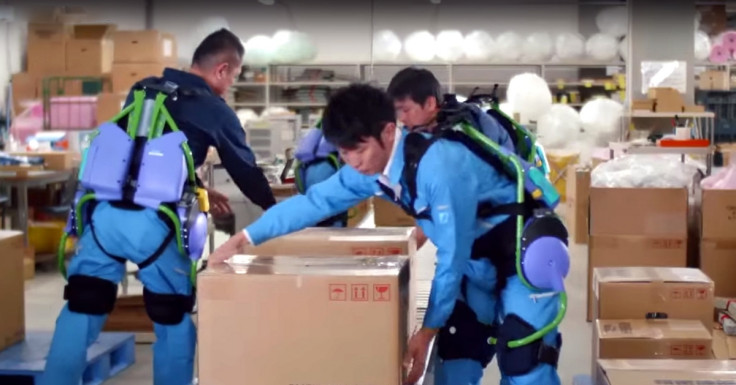Panasonic Assist Suit: Robot exoskeleton aids factory workers, nurses and care workers

To Panasonic, the future is all about robotic exoskeleton suits, as evidenced by a new video that showcases three different types of suits aimed at making life much easier for people working in a range of different industries.
In July 2015, IBTimes UK reported that Activelink, the robot development arm of Panasonic, was planning to mass produce a huge robot exoskeleton suit called the Power Loader, which resembles the Power Loader exoskeleton suit featured in the Alien films.
It works by strapping around the user's shoulder, waist and one thigh, with four embedded sensors that send signals to 20 engines in the suit to automatically move to reduce the energy the human needs to use in order to lift a heavy object and decrease the amount of stress placed on the lower back.
Now, in addition to that suit, Panasonic has showcased a much smaller exoskeleton featuring a lime green steel structure with purple plastic back and hip gear components that strap on to enable workers to easily lift heavy objects in a factory, known as the Power Assist Suit AWN-03. The suit reduces stress on the lower back and can reduce weight by up to 15kg, features automatic assist mechanism and has a battery life of eight hours.
Then there is the sleek metallic red PLN-01 "Ninja" exoskeleton suit, which is designed for workers and sportsmen who need to trek up steep, uneven terrain like mountain trails. This suit features power sensors at the soles of the feet and two motors at the lower back to help people walk more easily. Panasonic also says that it is currently working on an upper-body unit to help people lift large weights of at least 24 kg.
The video also showcases a new invention meant to help care workers and nurses to transfer patients from beds to wheelchairs. The Resyone is a bed that splits in two, and one part of the bed is triggered to convert itself into an armchair while the patient is lying on it, meaning that the caregiver no longer needs to lift the patient at all, and the patient can be moved while preserving their dignity.
There is also the Self Reliance Support Robot, which is designed to help elderly people become self-reliant and stand up on their own, walk around, visit the bathroom and maneouver themselves into a chair to watch TV.
"At Panasonic, we're using our expertise in the world of Assist Technology to bring to people a better life, a better world," said Noriyuki Shikata, Chief of the business unit in Panasonic's Eco Solutions Company.
Exoskeletons are not a completely new concept. In August 2014, Swiss startup Noonee launched the Chairless Chair, a 2kg exoskeleton suit that turns into an instant mobile chair. The invention is currently being trialled in car factories by BMW and Audi.
In Brazil, Duke University neuroengineer Dr Miguel Nicolelis continues work on mind-controlled robotic exoskeleton suits that enables paraplegics to stand up and walk, after the suits were successfully demonstrated at the opening ceremony of the 2014 World Cup.
© Copyright IBTimes 2024. All rights reserved.







